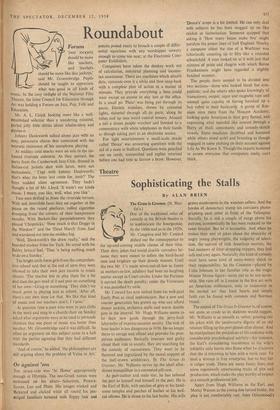Roundabout
Forum
'DISC JOCKEYS
Mr. A. L. Lloyd, looking more like a well- established solicitor than a wandering minstrel, Purled jolly little ditties about whales-ahoy and 8ipsies-o.
Johnny Dankworth talked about jazz with an easy, persuasive charm that contrasted with the neurotic insistence of his saxophone playing.
At midday cold snacks were on sale in the un- heated riverside cafeteria. As they queued, the Party from the Camberwell Jazz Club, dressed in Italian-cut jackets shot with lurex, were not enthusiastic, "Cept with Johnny Dankworth; that's what the boys 'ave come for, innit?' The boys nodded silent agreement. They hadn't thought a lot of Mr. Lloyd. `It wasn't our kinda music. I mean, you like, well, what you like.'
Two men drifted in from the riverside terrace. With sad, immobile faces they sat together at the piano on the raised platform, rolled cigarettes drooping from' the corners of their inexpressive mouths. With Beckett-like purposelessness they Played 'Chopsticks,' How much is that Doggy in the Window?' and the `Dead March' from Saul and wandered out into the midday fog, 'Well, Dankworth's the draw really,' said the bearded student from the Tech. He toyed with his flabby lettuce' leaf. `That 'n being nothing much to do on a Sunday.'
The bright sixth-form girls from the comprehen- sive school said that at the end of term they were allowed to take their own jazz records to music classes. `The teacher lets us play them for a bit and then she gets tired of it and puts on something of her own—Grieg or something.' They didn't see much point in playing jazz at school. 'After all, there's our own time for that. We like that kind of music and our teachers don't, I s'pose.'
At question time a man who went to jazz clubs in the week and sang in a church choir on Sunday asked what arguments were to be used to persuade children that one piece of music was better than another. Mr. Groombridge said it was difficult. So often an argument on this subject came to a halt with the parties agreeing that they had different standards.
'And of course,' he added, 'the philosophers are still arguing about the problem of Value in Art.'
Or against 'ern
THE SPACE-GOD was 'At Home' appropriately enough at Olympia. The neo-G reek names were embossed on his altars—Solartron, Powers- Samas, Leo and Pluto. His images winked and flickered and clicked while all round his pin- striped familiars hovered with floppy hair and pencils poised ready to broach a couple of differ- ential equations with any worshipper unwary enough to come too near, at the Electronic Com- puter Exhibition.
Computors have taken the donkey work out of calculation, industrial planning and income- tax assessment. There are machines which absorb data, ruminate over it awhile and then snap back with a complete plan of action in a matter of minutes. They provide everything a boss could want except an excuse to stay late at the office. In a small pit `Pluto' was being put through its paces. Electric impulses, shown by coloured lights, shivered through all its parts, along its tubes and up into weird control towers. Around a rail a dozen people watched and listened to a commentary with white telephones in their hands a; though taking part in an electronic seance.
For light entertainment a small-scale oracle called 'Deuce' was answering questions with the aid of a mate in Stafford. Questions were punched out on cards, transmitted and replies returned before one had time to furrow a brow. However, 'Deuce's' scope is a bit limited. He can only deal with subjects he has been mugged up on like cricket or factorisation. Someone quipped that asking it 'How many beans make five' might paralyse the power lines of half England. Nearby a computer about the size of a Wurlitzer was laboriously counting up to fifty like a retarded schoolchild. A man looked on at it with just that mixture of pride and chagrin with which Baron Frankenstein might have regarded a slightly botched monster.
The people there seemed to be divided into two sections—those who looked blank but sym- pathetic; and the others who spoke knowingly of transceivers, output, input and magnetic tape and seemed quite capable of having knocked up a boy robot in their backyards. A group of Rus- sians were there from the Moscow Academy, looking quite American in their grey flannel, and expressing what sounded like interest through a flurry of thick consonants and comedy-sketch vowels. Some machines throbbed and hummed while others stood quiet and brooding as though engaged in some plotting on their account against Life As We Know It. Though the experts hastened to assure everyone that computers really can't think.






































 Previous page
Previous page